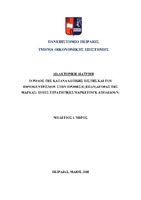Ο ρόλος της καταναλωτικής πίστης και του εθνοκεντρισμού στην πρόθεση (επαν)αγοράς της μάρκας: ποιές στρατηγικές μάρκετινγκ αποδίδουν;

View/
Keywords
Συμπεριφορά καταναλωτή ; Εξαγωγικό μάρκετινγκ ; Καταναλωτικός εθνοκεντρισμός ; Καταναλωτική πίστη ; Στρατηγικές πιστότηταςAbstract
In order to help their economies recover back from recessions, businesses should increase both their extroversion and adaptation in global markets. After World War II and until 2009, firms acted in a relatively stable economic environment. Within this context, economic prosperity and global economy steadily developed. Events of 9/11 1999, global recession of 2008 and migration flows resulted in a tendency for isolation, economic animosity and nationalism. In conclusion, nationalist parties gained increased public support worldwide, whilst in United Kingdom BREXIT was voted. The aforementioned facts reveal that citizens and consumers worldwide, after 2008, experience low expectations concerning the potential of their national economies. These progressions are followed by tendencies in domestic product preference in favor of imported brands. International business face great challenges regarding their strategies, since there is not an integrative decision making model on marketing strategies that best fit in exporting markets that are defined by Consumer Ethnocentrism (CE) and/or Consumer Confidence (CC). The objective of this PhD thesis is to bridge this gap by exploring the direct effects of marketing mix decisions on Customer Equity Drivers (CEDs). However, the primary objective is to explore the indirect effects of CE on the expected positive effects of CEDs on brand's Purchase Intentions (PI). The methodology entailed a survey method, in which about 400 Greek consumers of suntan oil prodtucts participated. The basic findings revealed consumers (re)purchase brands that are considered to be of high value for money and have strong relationship with them. In order for the marketers to win customers, they should adjust their strategies by intensifying distribution, which reduces access costs and provides value to customers. In addition, a further tactic is apply a premium pricing tactic, which creates strong relationships and perceived quality. These strategies are equally effective for both national and international brands. Furthermore, this research proved that consumers avoid to consume well-known and powerful brands with a great deal of Brand Equity (BE). This phenomenon is rather a global one not just Greek. As far as the international brands are concerned, CE dampens the positive relationship between Value Equity (VE) and PI. Thus, in contexts of potent CE, international businesses should focus in developing the strategy of Relationship Equity (RE) by applying tactics that create strong relationships with consumers. As soon as high CE is combined with high CC, the positive relationship between RE and PI is attenuated. In this case, the basic marketing strategy is to forge high VE. On the contrary, domestic brands gain preference in favor of foreign ones, since CE strengthens the relationship between VE and PI. Hence, domestic businesses should facilitate most the strategy of VE in order to attract ethnocentric consumers. These findings are expected to help businesses develop successful marketing strategies necessary to penetrate in both domestic and foreign markets. This knowledge will contribute in both micro and macro level to the success of businesses and growth of exports that every economy craves for.


